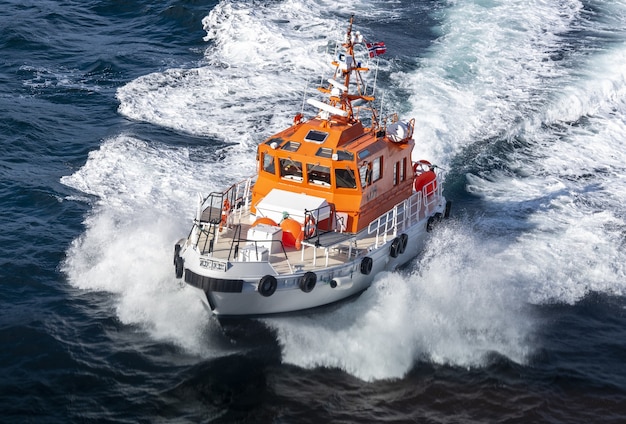What is maritime security training?
Maritime security training refers to a comprehensive set of courses and programs designed to enhance the safety and security of maritime operations. It encompasses a wide range of activities and strategies aimed at preventing and mitigating various threats in the maritime environment, including terrorism, piracy, smuggling, and illegal fishing.
The importance of maritime security training
Maritime security training plays a crucial role in safeguarding global trade, protecting maritime infrastructure, and ensuring the safety of seafarers. With over 90% of world trade being carried by sea, the need for effective security measures cannot be overstated. Maritime security threats not only have economic implications but also pose risks to national security and stability.
Training programs are designed to raise awareness among personnel working in the maritime industry, including ship crew, port security staff, and law enforcement officials. These programs aim to equip individuals with the necessary skills and knowledge to identify potential threats, respond to security incidents, and implement preventive measures.
The components of maritime security training
Maritime security training typically covers a variety of topics, ranging from risk assessment and threat analysis to emergency response procedures and conflict management. Some of the key components include:
- Piracy and armed robbery prevention: This involves training personnel on recognizing and mitigating risks associated with pirate attacks, such as evasion techniques, safe navigation practices, and the use of non-lethal weapons.
- Counter-terrorism measures: Training programs focus on detecting suspicious activities, implementing access control measures, and responding to potential terrorist threats.
- Emergency response: This includes training in first aid, fire prevention and firefighting, search and rescue operations, and crisis management to ensure an effective response to emergencies at sea.
- Security drills and exercises: Regular drills and exercises simulate real-life scenarios, allowing participants to practice their skills and evaluate the effectiveness of existing security plans and protocols.
“Maritime security training is vital in ensuring the safety of seafarers, protecting critical infrastructure, and maintaining the smooth flow of global trade.”
The role of regulatory frameworks
International maritime organizations and national authorities have established regulatory frameworks to ensure the implementation of effective security measures. The International Ship and Port Facility Security (ISPS) Code, for example, sets out minimum security requirements for ships and ports and mandates the development of security plans and training programs.
How Do I Start a Maritime Career?
Exploring the Maritime Industry
If you’re considering a career in the maritime industry, it’s important to understand the various sectors within this field. Maritime careers can range from working on commercial ships and cruise liners to offshore oil and gas platforms, research vessels, and more. Take the time to research and explore the different opportunities available to determine which area aligns with your interests and goals.
Educational Requirements and Training
Most maritime careers require specific education and training. The qualifications can vary depending on the role, but commonly, maritime professionals are required to obtain at least a high school diploma or GED equivalent. Many positions also necessitate specialized certifications or licenses. These can include STCW (Standard of Training, Certification, and Watchkeeping) certification, which is mandatory for working aboard commercial ships.
Apprenticeships and Internships
One effective way to start a maritime career is by participating in apprenticeships or internships. These programs provide hands-on experience while learning from experienced professionals. They can offer opportunities to gain valuable skills and network with industry experts. Research maritime companies and organizations that offer such programs to find one that suits your interests and goals.
Networking and Building Connections
Networking plays a crucial role in starting any career, including in the maritime industry. Attend industry conferences, seminars, and workshops to meet professionals and expand your network. Join maritime associations and online communities to stay updated on industry trends and job opportunities. Building connections can open doors to potential internships, job offers, and mentorship opportunities.
Job Search Strategies
When searching for maritime job opportunities, it’s important to utilize various strategies. Start by browsing online job boards and maritime-specific websites. Additionally, reach out to recruitment agencies that specialize in placing candidates within the maritime sector. Networking can also play a significant role in finding job openings, so keep in touch with your professional connections and attend industry events.
Continuing Education and Professional Development
The maritime industry is constantly evolving, so it’s crucial to stay updated with the latest developments and advancements. Consider pursuing additional certifications, attending industry conferences, and enrolling in continuing education programs to enhance your skills and knowledge. This demonstrates your commitment to professional growth and can make you more competitive in the job market.
Benefits and Challenges
Working in the maritime industry offers numerous benefits, such as the opportunity to travel, work in diverse environments, and potentially earn a good salary. However, it’s important to acknowledge the challenges as well, including long periods away from home, demanding work schedules, and potential risks associated with working at sea. Consider these factors when deciding if a maritime career is right for you.
How long does it take to get maritime certification?
Introduction
Gaining maritime certification is an important step for individuals seeking a career in the maritime industry. The duration of the certification process depends on various factors, including the type of certification, the individual’s prior experience, and the training program itself.
The Different Types of Maritime Certifications
There are different types of maritime certifications available, such as Merchant Mariner Credential (MMC), Officer Endorsement, and Ratings Certification. Each type of certification has its own requirements and timeframe for completion.
Factors Affecting Certification Duration
The time required to obtain a maritime certification can vary depending on several factors:
- Prior Experience: Individuals with prior experience in the maritime industry may be able to complete the certification process more quickly.
- Training Program: The duration of the training program itself can vary, ranging from a few weeks to several months.
The Certification Process
The certification process typically involves several steps:
- Educational Requirements: Some certifications require completion of specific educational courses or programs.
- Training and Assessments: Candidates must undergo training and assessments to demonstrate their competency in various maritime skills.
- Examinations: Examinations are conducted to test the candidate’s knowledge and understanding of maritime regulations, safety procedures, and industry-specific practices.
- Sea Service Requirements: Some certifications may require a minimum number of hours or days of sea service.
Duration of Certification Process
The duration of the certification process can range from a few weeks to several years, depending on the specific certification and individual circumstances.
For example, the process to obtain a Merchant Mariner Credential (MMC) typically takes around 60-90 days, while more advanced certifications like Officer Endorsements may take several years due to additional educational and sea service requirements.
Benefits of Maritime Certification
Obtaining maritime certification offers several benefits, including:
- Increased Employment Opportunities: Certification can enhance job prospects in the maritime industry, opening doors to a wider range of career options.
- Higher Earning Potential: Certified individuals often command higher salaries due to their specialized skills and knowledge.
- Enhanced Safety Skills: Certification programs ensure that individuals have the necessary training to operate safely in the maritime environment.
How do you get into maritime security?
1. Understanding the Basics
Before pursuing a career in maritime security, it’s important to have a solid understanding of the industry and its unique challenges. Familiarize yourself with key concepts such as international maritime law, piracy prevention, and vessel security measures.
2. Education and Training
Obtaining relevant education and training is essential for a career in maritime security. Consider enrolling in courses or programs that specialize in maritime security, such as those offered by maritime academies or specialized training institutions.
3. Gaining Experience
Building practical experience is crucial to entering the maritime security field. Seek opportunities to work on vessels or participate in security exercises and drills. This hands-on experience will not only enhance your skills but also demonstrate your commitment to the industry.
4. Certification and Licensing
Certifications and licenses play a significant role in maritime security. Look into obtaining certifications such as the International Ship and Port Facility Security (ISPS) Code certification or the Maritime Security Operator certification. These credentials will add credibility to your profile and increase your employability.
5. Networking
Networking within the maritime security industry can open doors to job opportunities and valuable connections. Attend industry conferences, join professional organizations, and engage with industry professionals on social media platforms. These interactions can provide insights, mentorship, and potential job leads.
6. Job Search Strategies
When searching for maritime security positions, start by exploring job boards and websites that specialize in maritime security or related fields. Additionally, reach out to maritime security companies directly, send targeted resumes, and attend job fairs or recruitment events.
7. Further Training and Specializations
To advance your career in maritime security, consider pursuing further training and specializations. This could include areas such as cybersecurity in maritime operations, crisis management, or advanced security tactics. These additional skills will make you a more valuable asset in the industry.
8. Continual Learning
Maritime security is a constantly evolving field, so it’s important to stay up to date with the latest industry trends, technological advancements, and regulations. Continual learning through professional development courses, seminars, and industry publications is essential for long-term success.
9. International Opportunities
Consider exploring international opportunities in maritime security. Many countries around the world require maritime security professionals to protect their waters and vessels. Research the specific requirements and qualifications needed for working in different regions to broaden your career prospects.
10. Advancing Your Career
As you gain experience in the maritime security field, opportunities for advancement may arise. This could include roles such as maritime security consultant, team leader, or manager. Continuously seek growth opportunities and be proactive in taking on new challenges.
“Maritime security offers rewarding career opportunities for individuals passionate about protecting the seas.” – Anonymous
Conclusion
Maritime security training is a crucial aspect of protecting maritime operations from various threats. By equipping individuals with the necessary skills and knowledge, these programs contribute to safeguarding global trade, ensuring the safety of seafarers, and promoting stability in the maritime domain. With continuously evolving threats, ongoing training and preparedness are essential to maintain the security of our oceans.
Starting a maritime career requires research, education, networking, and perseverance. By exploring the various sectors within the industry, obtaining the necessary qualifications, gaining practical experience through internships or apprenticeships, and continuously developing your skills, you can set yourself up for success in the maritime field. Remember to consider the benefits and challenges associated with this career path and always stay informed about the latest trends and opportunities within the industry.
While the duration of obtaining maritime certification can vary, it is an essential step for those aspiring to have a successful career in the maritime industry. The time invested in the certification process is well worth it, as it opens up numerous opportunities and benefits in this dynamic field.



